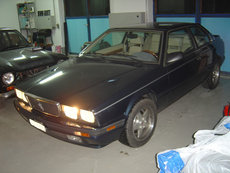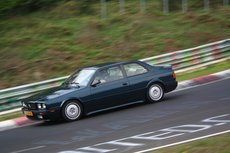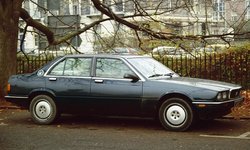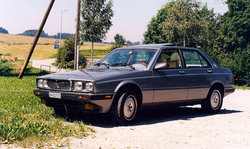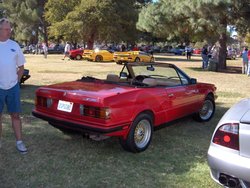Difference between revisions of "Maserati Biturbo"
m |
m |
||
| Line 2: | Line 2: | ||
{| border=1 cellspacing=3 cellpadding=4 style="float:right; margin:0 0 .5em 1em; width:250px; background:#505050; border-collapse:collapse; border:1px solid #999; font-size:83%; line-height:1.5; " summary="Infobox Automobile" | {| border=1 cellspacing=3 cellpadding=4 style="float:right; margin:0 0 .5em 1em; width:250px; background:#505050; border-collapse:collapse; border:1px solid #999; font-size:83%; line-height:1.5; " summary="Infobox Automobile" | ||
|- style="text-align:center; background:#505050;" | |- style="text-align:center; background:#505050;" | ||
| − | | colspan=2 style="padding:0; background:#333333; color:#fff; border-bottom:1px solid #999;" |[[Image:Maserati 222E 2.jpg| | + | | colspan=2 style="padding:0; background:#333333; color:#fff; border-bottom:1px solid #999;" |[[Image:Maserati 222E 2.jpg|280px|Maserati 222SE]] |
|- style="color:#fff; background:darkred; font-size:larger;" | |- style="color:#fff; background:darkred; font-size:larger;" | ||
! colspan=2 |'''Maserati Biturbo''' | ! colspan=2 |'''Maserati Biturbo''' | ||
Revision as of 06:14, 20 October 2009
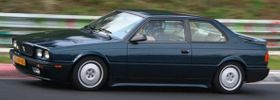
| |
| Maserati Biturbo | |
|---|---|
| Manufacturer | Maserati |
| Parent company | Fiat Group (since 1993) |
| Production | 1981-1994 |
| Body style | 2-door coupé 4-door sedan 2-door cabriolet |
| Class | Sports / Luxury |
| Engine | 2.0L, 2.5L, and 2.8L V6, twin turbocharged |
| Platform | |
| Layout | FR layout |
| Transmission | 5-speed manual 3-speed automatic |
| Predecessor | Maserati Merak |
| Wheelbase | 251cm (Coupé) 260cm (Sedan, 228) 240cm (Spyder) |
| Length | 415cm (Coupé) 440cm(Sedan) 404cm (Spyder) 445cm (228) |
| Width | 171cm (Coupé, Spyder) 173cm (Sedan) 186cm (228) |
| Height | 131cm (Coupé, Spyder, 228) 136cm (Sedan) |
| Successor | Shamal and Ghibli II |
| Similar | BMW 3 Series |
| Designer | Pierangelo Andreani |
The Maserati Biturbo is a sports car introduced by Maserati in 1981. The Biturbo was a two-door, four-seater notchback coupé featuring, as the name implies, a two-litre V-6 engine with two turbochargers (of somewhat smaller dimensions than the BMW 3 Series (E21) cars of the time) and a luxurious interior. The car was designed by Pierangelo Andreani, an engineer from the De Tomaso team, somehow influenced by the design of the newer Quattroporte III (Italdesign Giugiaro), as it can be noticed on the front fascia.
Export versions came initially with a 2.5L V6, after 1989 it was enlarged to 2.8 Litres, while for Italy a two-litre high-performance version was originally produced (to avoid the 38% sales tax imposed at the time on cars displacing more than 2000 cc). The aluminum 90 degree SOHC V6 engine was roughly based on the 2.0L Merak engine. Itself based on earlier V8 Formula One Maserati engines, designed by Giulio Alfieri (1924 - 2002). The carbureted 2.5L engine 185hp and Template:Auto ftlbf of torque in North American spec and slightly more elsewhere. Fuel injection was fitted in 1987 raising power to 187hp. In 1989 the 2.8L engine bumped power to 225hp and 246ftlbf of torque for North America and 250hp for Europe.
All Maserati models from the Biturbo's introduction in 1981 until 1997 (except the Quattroporte) were based on the original Biturbo architecture, among them the four-door 420/425 and 4.24v, the Spyder, the Karif , the 228 and 2.24v, the Maserati Racing and the later Shamal and Ghibli II.
History
When Alessandro de Tomaso acquired Maserati in 1976, he had ambitious plans for the marque. His plan was to combine the prestige of the Maserati brand with a sports car that would be more affordable than the earlier high-priced models that had traditionally made up the Maserati range. In fact, Maserati ceased making supercars like the ones developed under Citroën ownership altogether, like the Bora and Khamsin.
The Biturbo was initially a strong seller and brought Italian prestige to a wide audience, with sales of about 40,000 units. Sales figures fell in subsequent years, until de Tomaso sold the company out to Fiat. It did not cure the problem.
It is #28 in the BBC book of "Crap Cars".
It reflects that the maintenance of such small, high performance engines require professional attention. Too many of these cars have been used on a "run to fail" mode which had dramatic impact on their life expectancy and thus their image. Specific output of these engines in their later road configuration was in the range of 145 to 165 hp/l, one of the highest in its category.
The Biturbo competed unsuccessfully in the British Touring Car Championship in the late 1980s, the European Touring Car Championship and the World Touring Car Championship (1987).
Biturbo Engines
The Maserati Biturbo was the first ever production biturbo engine. The 2 liter version featured wet aluminium sleeves coated with Nikasil. The last street version featured over 150 hp/liter and 140ftlbf/liter torque.
A V6 1996 cc DOHC 36 valve engine has been developed but never reach manufacturing
| Série | Displacement | Head | Fuel system | Model |
|---|---|---|---|---|
| AM 452 | 2000 cc | 18 valves | carburator | Biturbo, Biturbo S |
| AM 453 | 2500 cc | 18 valves | carburator | Biturbo 2500 |
| AM 470 | 2000 cc | 18 valves | injection | Biturbo i |
| AM 471 | 2000 cc | 18 valves | injection | Si, 2.22S, 2.22SR, 4.18, 4.30, Spyder |
| AM 472 | 2500 cc | 18 valves | injection | Biturbo 2500i |
| AM 473 | 2800 cc | 18 valves | injection | 4.30, 222SR, Spyder, Karif |
| AM 475 | 2000 cc | 24 valves | injection | 2.24, 4.24, Spyder |
| AM 490 | 2000 cc | 24 valves | injection | Racing, Barchetta Stradale |
| AM 495 | 2000 cc | 24 valves | injection | Ghibli II |
| AM 496 | 2000 cc | 24 valves | injection | Ghibli Cup |
| AM 477 | 2800 cc | 24 valves | injection | 2.22 4V, 430 4V, Ghibli II |
| AM 501 | 2000 cc | 24 valves | injection | Barchetta Corsa |
Biturbo
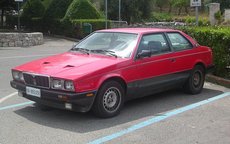
The first Biturbo version was introduced in December 1981, a two door coupe. The Biturbo name disappeared with update in 1988 and after 1994 was introduced Ghibli II.
Versions:
| Model | Years | Engine | Displacement | Power | Fuel system | Notes |
|---|---|---|---|---|---|---|
| Biturbo | 1982-85 | V6 ohc | 1995 cc | 180 hp | carburetor, turbo | Only Italy |
| Biturbo E | 1983-85 | V6 ohc | 2491 cc | 185 hp | carburetor, turbo | |
| Biturbo S | 1983-85 | V6 ohc | 1995 cc | 205 hp | carburetor, turbo | Only Italy |
| Biturbo 2.5 S | 1984-87 | V6 ohc | 2491 cc | 196 hp | carburetor, turbo | Catalysator |
| Biturbo | 1985-87 | V6 ohc | 1995 cc | 180 hp | carburetor, turbo | Only Italy |
| Biturbo 2.5 E | 1985-88 | V6 ohc | 2491 cc | 185 hp | carburetor, turbo | Catalysator |
| Biturbo S | 1985-86 | V6 ohc | 1995 cc | 210 hp | carburetor, turbo | Only Italy |
| Biturbo i | 1986-90 | V6 ohc | 1995 cc | 185 hp | Fuel injection, turbo | Only Italy |
| Biturbo Si | 1987-88 | V6 ohc | 1995 cc | 220 hp | Fuel injection, turbo | Only Italy |
| Biturbo 2.5 Si | 1987-88 | V6 ohc | 2491 cc | 188 hp | Fuel injection, turbo | Catalysator |
| 2.24V | 1988-92 | V6 dohc | 1996 cc | 245 hp | Fuel injection, turbo | Only Italy |
| 222 4v | 1988-91 | V6 dohc | 2790 cc | 279 hp | Fuel injection, turbo | Catalysator |
| 222 E | 1988-90 | V6 ohc | 2790 cc | 225 hp | Fuel injection, turbo | Catalysator |
| 222 SE | 1990-91 | V6 ohc | 2790 cc | 250 hp | Fuel injection, turbo | |
| 222 SE | 1990-91 | V6 ohc | 2790 cc | 225 hp | Fuel injection, turbo | [[Catalysator |
| 2.24V | 1991-93 | V6 dohc | 1996 cc | 245 hp | Fuel injection, turbo | Only Italy |
| 2.24V | 1991-93 | V6 dohc | 1996 cc | 240 hp | Fuel injection, turbo | Catalysator, Only Italy |
| 222 SR | 1991-93 | V6 ohc | 2790 cc | 225 hp | Fuel injection, turbo | Catalysator |
| Racing | 1991-91 | V6 dohc | 1996 cc | 285 hp | Fuel injection, turbo |
See also:Maserati Racing
420/425/430
Two years after Biturbo introduction was unveiled foor door family version. This version has longer wheelbase, 2.6 metres ({{rnd/cExpression error: Unexpected < operator.decExpression error: Unexpected < operator.|Expression error: Unexpected < operator.|(Expression error: Unrecognized punctuation character "[".)}} in)Template:Convert/test/A. The four door version was replaced in 1994 with Maserati Quattroporte IV.
Versions:
| Model | Years | Engine | Displacement | Power | Fuel system | Notes |
|---|---|---|---|---|---|---|
| 425 | 1983-89 | V6 ohc | 2491 cc | 200 hp | carburetor, turbo | |
| 420 | 1985-88 | V6 ohc | 1995 cc | 180 hp | carburetor, turbo | Only Italy |
| 420i | 1986-88 | V6 ohc | 1995 cc | 190 hp | Fuel injection, turbo | |
| 420 S | 1986-88 | V6 ohc | 1995 cc | 210 hp | carburetor, turbo | Only Italy |
| 430 | 1987-90 | V6 ohc | 2790 cc | 225 hp | Fuel injection, turbo | Catalysator |
| 425i | 1987-90 | V6 ohc | 2491 cc | 188 hp | Fuel injection, turbo | Catalysator |
| 422 | 1988-90 | V6 dohc | 1996 cc | 220 hp | Fuel injection]], turbo | Catalysator |
| 4.18v | 1990-94 | V6 ohc | 1995 cc | 220 hp | Fuel injection]], turbo | Catalysator |
| 4.24v | 1990-92 | V6 dohc | 1996 cc | 245 hp | Fuel injection, turbo | Only Italy |
| 4.24v II | 1991-94 | V6 dohc | 1996 cc | 240 hp | Fuel injection, turbo | Catalysator |
| 430 4v | 1991-94 | V6 dohc | 2790 cc | 279 hp | Fuel injection, turbo | Catalysator |
See also:Maserati 420
Spyder
1986 Maserati Biturbo Spider
- 2a 3.jpg
- 5a 3.jpg
- F8 3.jpg
- 32 3.jpg
- 3a 3.jpg
- 61 3b.jpg
The Spyder version was introduced in Turin Motor Show in 1984. The car was designed and built by Zagato. The Spyder version has shorter wheelbase, 2.4m.
Versions:
| Model | Years | Engine | Displacement | Power | Fuel system | Notes |
|---|---|---|---|---|---|---|
| Spyder | 1984-88 | V6 ohc | 1995 cc | 180 hp | carburetor | Only Italy |
| Spyder 2.5 | 1984-88 | V6 ohc | 2491 cc | 192 hp | carburetor, turbo | Catalysator |
| Spyder i | 1986-87 | V6 dohc | 1996 cc | 185 hp | Fuel injection, turbo | |
| Spyder i | 1987-88 | V6 dohc | 1996 cc | 195 hp | Fuel injection, turbo | |
| Spyder 2.5i | 1988-89 | V6 ohc | 2491 cc | 188 hp | Fuel injection, turbo | Catalysator |
| Spyder 2.8i | 1989-91 | V6 ohc | 2790 cc | 250 hp | Fuel injection, turbo | |
| Spyder 2.8i | 1989-91 | V6 ohc | 2790 cc | 225 hp | Fuel injection, turbo | Catalysator |
| Spyder i | 1989-91 | V6 dohc | 1996 cc | 220 hp | Fuel injection, turbo | Catalysator, Only Italy |
| Spyder III | 1991-94 | V6 dohc | 1996 cc | 245 hp | Fuel injection, turbo | Only Italy |
| Spyder III 2.8 | 1991-94 | V6 dohc | 2790 cc | 225 hp | Fuel injection, turbo | Catalysator |
| Spyder III | 1991-94 | V6 dohc | 1996 cc | 240 hp | Fuel injection, turbo | Catalysator, Only Italy |
228
The Maserati 228 is two door Gran turismo-version, it was meant to same markets as earlier 3500 GT and Mexico. The 228 was introduced in Turin Motor Show in 1986, it was built longer four door chassis and has bigger 2.8 litre biturbo engine. The 228 was built 469 copies until 1992.
Versions:
| Model | Years | Engine | Displacement | Power | Fuel system | Notes |
|---|---|---|---|---|---|---|
| 228 | 1986-92 | V6 ohc | 2790 cc | 250 hp | Fuel injection, turbo | |
| 228 | 1986-92 | V6 ohc | 2790 cc | 225 hp | Fuel injection, turbo | Catalysator |
| 222 | 1988-92 | V6 dohc | 1996 cc | 220 hp | Fuel injection, turbo | Catalysator, Only Italy |
1989 Maserati 228
- 1989 Maserati 228 1.jpg
- 1989 Maserati 228 2.jpg
- 1989 Maserati 228 3.jpg
- 1989 Maserati 228 4.jpg
- 1989 Maserati 228 5.jpg
- 1989 Maserati 228 6.jpg
- 1989 Maserati 228 7.jpg
- 1989 Maserati 228 8.jpg
References
| Maserati | |
|---|---|
| 1950-1969 | A6 | 3500 | 5000 GT | Mistral | Quattroporte I | Sebring | Mexico | Ghibli I |
| 1970-1979 | Khamsin | Bora | Indy | Merak | Quattroporte II | Quattroporte III | Kyalami |
| 1980-1999 | Biturbo | Spyder I | Quattroporte III Royale | Shamal | 220 | 228 | 420 | 430 |Karif | Barchetta | Ghibli II | Quattroporte IV | 3200 GT |
| 2000-present | Coupé-Cabrio | Coupe | Spyder II | Gran Sport | Quattroporte V | MC12 | Gran Turismo |
| Racing Vehicles | 26M · 8C · V8RI · 8CM · 8CLT · 8CTF · 8CL · 6CM · 4CL/4CLT · A6GCM · 150S · Tipo 63 · Tipo 65 · 250F · 200S · 250S · 300S · 350S · 450S · Tipo 61 "Birdcage" · Tipo 151 · Tipo 154 · MC12 GT1 · Trofeo |
| Concept Cars | Boomerang · Birdcage 75th |
| Fiat Group brands | Abarth | Alfa Romeo | Autobianchi | Ferrari | Fiat | Lancia | Innocenti | Maserati |
| Maserati S.p.A., a subsidiary of the Fiat S.p.A. since 1993, road car timeline, 1950s–present | ||||||||||||||||||||||||||||||||||||||||||||||||||||||||||||||||||||||
| Type | 1950s | 1960s | 1970s | 1980s | 1990s | 2000s | 2010s | |||||||||||||||||||||||||||||||||||||||||||||||||||||||||||||||
| 0 | 1 | 2 | 3 | 4 | 5 | 6 | 7 | 8 | 9 | 0 | 1 | 2 | 3 | 4 | 5 | 6 | 7 | 8 | 9 | 0 | 1 | 2 | 3 | 4 | 5 | 6 | 7 | 8 | 9 | 0 | 1 | 2 | 3 | 4 | 5 | 6 | 7 | 8 | 9 | 0 | 1 | 2 | 3 | 4 | 5 | 6 | 7 | 8 | 9 | 0 | 1 | 2 | 3 | 4 | 5 | 6 | 7 | 8 | 9 | 0 | 1 | 2 | 3 | 4 | 5 | 6 | 7 | 8 | 9 | |
| Ownership | Orsi family | Citroën | De Tomaso | Fiat S.p.A. | ||||||||||||||||||||||||||||||||||||||||||||||||||||||||||||||||||
| Executive | Biturbo | |||||||||||||||||||||||||||||||||||||||||||||||||||||||||||||||||||||
| Luxury | Quattroporte | QP II | QP III | QP IV | QP V | |||||||||||||||||||||||||||||||||||||||||||||||||||||||||||||||||
| GT | A6 | 3500 GT | Sebring | 228 | Ghibli II | |||||||||||||||||||||||||||||||||||||||||||||||||||||||||||||||||
| Mistral | Karif | |||||||||||||||||||||||||||||||||||||||||||||||||||||||||||||||||||||
| 5000 GT | Ghibli | Khamsin | Shamal | 3200 GT | Coupé | GT | ||||||||||||||||||||||||||||||||||||||||||||||||||||||||||||||||
| 2+2 | Mexico | |||||||||||||||||||||||||||||||||||||||||||||||||||||||||||||||||||||
| Indy | Kyalami | |||||||||||||||||||||||||||||||||||||||||||||||||||||||||||||||||||||
| Mid-engine | Merak | |||||||||||||||||||||||||||||||||||||||||||||||||||||||||||||||||||||
| Bora | MC12 | |||||||||||||||||||||||||||||||||||||||||||||||||||||||||||||||||||||
